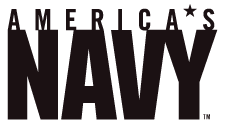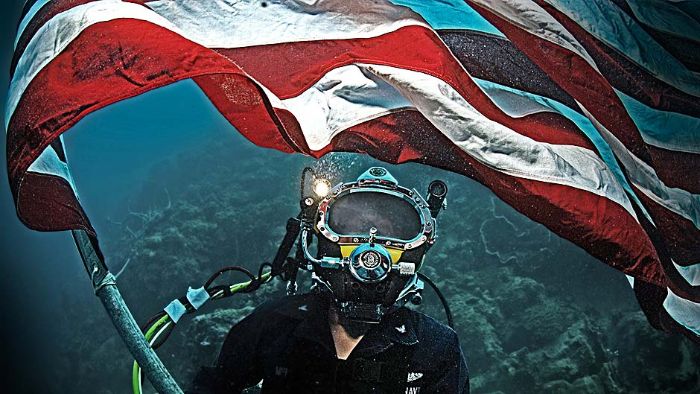"We Dive the World Over" Navy Diver
No matter how extreme the condition or task at hand, Navy Divers will be there to play a vital role. Taking calculated risks when no one else will. Using willpower and thorough mental and physical training to excel in any situation. All for the purpose of a greater goal: to make the world a better, safer place.
Their accomplishments are epic. Their expertise is unrivaled. No other force is more intensely trained to succeed in the perilous world of underwater adventure. Each assignment they take on is crucial and backed by a steadfast dedication to teamwork.
Job Description
As a Navy Diver, you will be part of an extraordinary brotherhood. You will journey anywhere from the darkest depths of the world’s oceans to freezing arctic-like conditions underneath icebergs. Accomplishing a number of tasks only few can perform. All with the focus to achieve.
In this role you can expect to:
- Perform a variety of diving salvage operations and special diving duties worldwide
- Take part in construction and demolition projects
- Execute search and rescue missions
- Support military and civilian law enforcement agencies
- Serve as the technical experts for diving evolutions for numerous military Special Operations units
- Provide security, communications and other logistics during Expeditionary Warfare missions
- Carry out routine ship maintenance, including restoration and repair
Your strength and determination will prove you are anything but a typical diver.
Specific Responsibilities
Your job as a Navy Diver could encompass many dive specialties, including:
Salvage and recovery – Locating and retrieving wreckage; conducting harbor and waterway clearance, underwater repairs and salvage operations in all environments
Deep submergence – Probing the greatest depths in the name of research and other classified missions
Ship husbandry – Inspecting and repairing ships and submarines
Saturation diving – Working and living at extreme depths for days or weeks at a time
No college degree is required to become a Navy Diver, but a high degree of difficulty and satisfaction come standard with nearly everything you’ll do. Training is tough and ongoing. And for those with further leadership aspirations and a college degree, Officer roles are available – providing opportunities to lead and train others.
Work Environment
The motto of Navy Divers is fittingly “We Dive the World Over.” As a member of this dedicated Special Operations force, you will travel the world, working everywhere imaginable. You will be specially trained to perform in just about every possible undersea environment – from clear, tropical conditions to frigid, dark arctic regions, shallow waters to deep seas. No matter the time, place or pressure, there is no room for error.
Training and Advancement
Training to become a Navy Diver is more than just routine; it also tests your will power, physical and mental strength, as well as your desire and intelligence. Complete the training, and you’ll rank among the world’s elite underwater adventurers, forging a reputation that builds on a legacy of achievement and honor. Do exceptional work and expect to receive exceptional rewards in return.
NAVAL DIVING AND SALVAGE TRAINING CENTER (NDSTC), PANAMA CITY, FLORIDA
After completion of Recruit Training or acceptance in the Navy Diver program from the Fleet, you will go to Naval Training Command, Great Lakes, for the Diver Preparation Course (32 training days, including 20 days of Basic Electrical and Engineering courses). Upon completion of the training, you will go to NDSTC, Panama City, Fla., for Second Class Dive School, which is 70 training days long. The NDSTC is divided into Fleet and specialized sections. Regardless of your section, you could be taught anything from underwater mechanics, to dive medicine, physics and planning, to salvage operations, and more.
FLEET TRAINING
After completing Second Class Dive School, you will be assigned to one of the Navy Diving Units to hone the undersea diving and salvage skills required by the United States Navy. You will be trained to perform underwater ship repair, salvage and construction, using either SCUBA equipment or a surface-supplied-air diving system. Training for Diving Medical Officers and Diving Medical Technicians is also part of Fleet training.
ADVANCED TRAINING
Many experienced divers return to NDSTC for further course work so they can qualify as First Class Divers and Master Divers.
SPECIALIZED TRAINING
A Navy Diver gets specialized training in demolition and mixed-gas diving.
Education Opportunities
As a member of the Naval Special Warfare/Naval Special Operations (NSW/NSO) community, you will have any number of unique opportunities to advance your knowledge. You may receive education and training about military tactics, deep-sea diving or a number of other tactical military procedures. The courses in this field are demanding, but those who accept these challenges will be rewarded not only with extra pay, but extraordinary duty assignments anywhere in the world.
You can put your training and education to use outside your official duties. Through the American Council on Education (ACE), you may receive college credit for what you’ve learned in your training “pipeline.” Check out the Military Guide Online to find out what training qualifies for college credit. If you have any questions about converting your Navy education into college credit, you can call ACE at 866-205-6267 for answers.
Pay Range
In addition to normal military pay and allowances, the Navy offers a $8,000 enlistment bonus for Divers. You will also earn extra dive pay and may qualify for additional special duty assignment pay, demolition pay and/or sea pay/sub pay.
For complete details on available special pay and enlistment bonuses, contact a recruiter.
Qualifications
To be accepted by the Navy Dive and Salvage Training Command (NDSTC), located in Panama City, Fla., you can enlist no later than your 30th birthday. You can apply for the Navy Challenge contract for Divers in the Delayed Entry Program at any time during your first enlistment.
ENTRY REQUIREMENTS
- Males and females are eligible
- Eyesight 20/200 bilateral correctable to 20/25 with no color blindness
- Minimum Armed Services Vocational Aptitude Battery (ASVAB) score: AR+VE=103, MC=51 or GS+MC+EI=165
- Must be a U.S. citizen and eligible for security clearance
The chart below highlights the current minimum Navy Physical Screening Test (PST) requirements for Navy Challenge Programs – for aspiring members who are in the Delayed Entry Program (DEP), in Boot Camp or already serving in the Navy.
| Minimum PST Physical Screening Test | SEAL | SWCC | EOD | Diver | AIRR |
|---|---|---|---|---|---|
| Swim 500 yards (450 M) – breaststroke or sidestroke [in minutes] | 12:30 | 13:00 | 14:00 | 14:00 | 12:00* |
| REST: 10 MINUTES | |||||
| Push-ups [in 2 minutes] | 42 | 42 | 42 | 42 | 42 |
| REST: 2 MINUTES | |||||
| Sit-ups [in 2 minutes] | 50 | 50 | 50 | 50 | 50 |
| REST: 2 MINUTES | |||||
| Pull-ups [in 2 minutes] | 6 | 6 | 6 | 6 | 4 |
| REST: 10 MINUTES | |||||
| Run 1.5 miles [in minutes] | 11:00 | 12:30 | 12:45 | 12:45 | 12:00 |
*AIRR may use sidestroke or breaststroke and utilize American crawl/freestyle or a combination of all.
NOTE: You should consult your physician or other health-care professional before starting any exercise regime or other fitness program to determine if it is right for your needs. This is particularly true if you (or your family) have a history of medical illnesses or ailments that could be made worse by a change in physical activity. Do not start a fitness program if your physician or health-care provider advises against it.
After the Navy
The strength and perseverance you acquire as a Navy Diver will translate to great success in the civilian sector. Employers will value your self-determination and loyalty. Jobs within the Navy’s Naval Special Warfare/Naval Special Operations (NSW/NSO) forces have similar civilian roles that include anything from emergency medicine to chemical protection and response to diving recovery and much more.
 America's Navy
America's Navy

